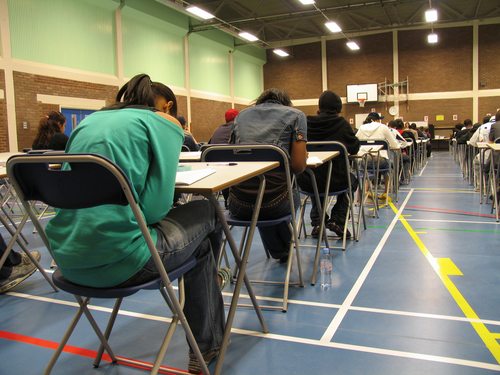
Laurence Gough / Shutterstock.com
October 13, 2012; Source: The Atlantic
Writing for The Atlantic, former teacher John T. Tierney takes on advanced placement (AP) courses, the purportedly college-equivalent high school courses that we all want our kids to take and ace. Ultimately, his concerns get to the question of whether the College Board, which most people know for its SAT and PSAT tests, is really operating as a nonprofit at all. Tierney, who is not to be confused with U.S. Rep. John F. Tierney (D-Mass.), calls AP courses “one of the great frauds currently perpetrated on American high-school students.”
Sign up for our free newsletters
Subscribe to NPQ's newsletters to have our top stories delivered directly to your inbox.
By signing up, you agree to our privacy policy and terms of use, and to receive messages from NPQ and our partners.
Tierney ticks off a number of charges against AP courses:
- They “are not…remotely equivalent to the college-level courses they are said to approximate;”
- “Increasingly, students don’t receive college credit for high scores on AP courses…[but] simply are allowed to opt out of the introductory sequence in a major…[which] more and more students say…[is] a bad idea;”
- “[I]ncreasing numbers of the students who take them are marginal at best, resulting in growing failure rates on the [AP] exams;”
- “[L]arge percentages of minority students are essentially left out of the AP game…[and therefore] are at a competitive disadvantage when it comes to college admissions;”
- To offer AP courses which often have smaller class sizes and better teachers, “schools have to increase the sizes of their non-AP classes, shift strong teachers away from non-AP classes, and do away with non-AP course offerings, such as ‘honors’ courses;” and
- “[T]he most serious count against Advanced Placement courses is that the AP curriculum leads to rigid stultification—a kind of mindless genuflection to a prescribed plan of study that squelches creativity and free inquiry. The courses cover too much material and do so too quickly and superficially. In short, AP courses are a forced march through a preordained subject, leaving no time for a high-school teacher to take her or his students down some path of mutual interest. The AP classroom is where intellectual curiosity goes to die.”
According to Tierney, the College Board earns half of its revenues from AP courses. For the period from July 1, 2010 to June 30, 2011, according to its most recent available Form 990, the College Board had $720.65 million in revenues (96.5 percent of which were program service revenues) and expenses of $684.98 million, yielding what Tierney would describe as a “profit” of 9.9 percent (he says that the College Board’s “profit” in 2009 was 8.6 percent).
Tierney argues that the College Board may be a bit thin in its nonprofit DNA. He cites Americans for Educational Testing Reform’s (AETR) criticism of the College Board’s profit margin; the organization gives the College Board a “D” grade. AETR’s position is that the College Board and two other major testing organizations, ETS and ACT, should have their nonprofit status repealed. Among AETR’s complaints about the College Board? Political lobbying to “expand its monopoly,” its “massive profits,” and “exorbitant” salaries paid to executives. The latest numbers on the College Board show total compensation for Gaston Caperton, who was scheduled to step down as the organization’s president yesterday, at $1.45 million, well more than twice the compensation of the organization’s second-highest paid executive.
To Tierney, “It’s clear the College Board has the mentality of a voracious corporation.” It may be a voracious nonprofit corporation, but do its growth, profitability, and executive compensation levels really make it a for-profit?—Rick Cohen











